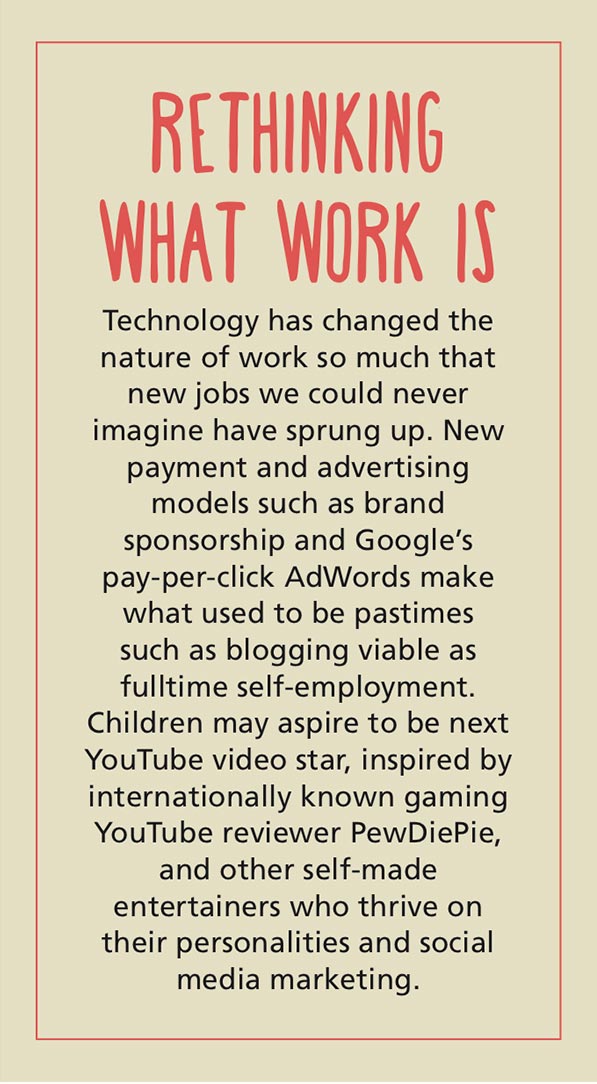Rise Of The Freelancer
.jpg)
When Mr Zakaria Zainal left his first job as a trade officer at the Ministry of Trade and Industry, a freelance career was not top on his mind.
He had wanted to pursue a personal photography project on the Singapore Gurkhas. But along the way, the freelance photography assignments he took up became so numerous, they turned into a full-time job — one that he has enjoyed for five years now.
Mr Zakaria is among a growing pool of freelance professionals who enjoy the freedom of working for themselves. The perks include being able to dictate their own schedules and choose assignments that they are enthusiastic about.
Freelance workers provide a variety of services: writing, design, photography, financial planning, social media consulting, even house cleaning or personal shopping.
While freelancers’ varied work arrangements make it tricky to track their numbers officially, websites connecting them to businesses have seen a rise in users. Freelancer.sg, for example, had 100,000 users in 2015, up from 15,000 users in 2012, with 74% of their users in the millennial age group.

Changing demographics, lifestyle choices and needs all contribute to the shift towards this mode of work, which appeals not just to millennials, with their evolving value systems and different aspirations for what they want out of life, but also to a maturing workforce who may be seeking a different pace of work and life, says Ms Chong Ee Rong, Managing Director at Ogilvy Public Relations and a member of the CFE sub-committee for Future Jobs and Skills.
Freelancing is also boosted by the availability of digital platforms that help match service providers with clients, from aggregator sites like UpWork to more specialised ones such as Bolt Media for content creators, Vanitee for beauty professionals and Grab for drivers. Moreover, with mobile connectivity to the Internet, it is now possible to work from anywhere — cafes, co-working spaces, even the beach.
The advantages for businesses
Organisations also stand to gain from freelancers’ work ethic and a wider range of expertise. For companies that can unpack work into tasks for different people to do, the hiring pool then expands to include a wider range of talent, including those who are not based locally.
Because freelancers often rely on word-of-mouth referrals and their portfolios, they have to be excellent at what they do, says Ms Chong. “If the job isn’t done well, they’re not going to get their next job. So you have a workforce of people who are self-motivated and a lot more focused.”
A possible challenge is building a particular culture or team environment at work.
Ms Elaine Yew, who is on the Global Executive Committee of Egon Zehnder, a global organisational advisory firm, and also a CFE Jobs and Skills subcommittee member says: “Companies will need to ensure that they support the freelancers not just administratively, but also in the ‘soft tissue’ aspects of what makes an organisation work well — creating a common purpose and sense of common identity and affliation with a team.”
To tap the potential of freelancers, Singapore businesses will need to be open-minded and broaden their networks to find the best talent, she adds, and think afresh about how to design roles, with clearly expressed desired outcomes rather than focusing on input, such as hours spent on a project.
Challenges for freelancers
But it can be a challenging landscape for freelancers, who do not have access to the social safety nets provided for in a full-time job, such as medical benefits, sick leave and the employer’s Central Provident Fund contribution.
For Mr Zakaria, a portion of his income goes towards a retirement fund. Meanwhile, freelance yoga instructor Peggy Chan has found a niche serving mature clients. But like many freelancers, she worries about timely payments and has a fluctuating monthly income, she told The Straits Times.
Freelance workers will also need business management skills as they are managing their own businesses, says Ms Yew. “They would need to be really good at project management, and also be better marketers of themselves since they would not have an organisational brand to rely on.”
Protecting the “people as businesses”
As risks are transferred from businesses to individuals, calls are growing for better support for freelance workers.
In January 2016, Member of Parliament Ang Hin Kee, who is Assistant Secretary-General of the NTUC, called for policies on freelancing to be updated, saying “some of the rules appear unclear”. He said it was timely for the labour movement to recognise freelancing as a viable career option, and to tailor policies to help the self-employed.

In an interview with The Straits Times, he said: “Whether it be getting more assignments, more timely payments or more respect, it has to be clearly conveyed to the buyers of their services that not only are these the right things to do, they are also the only way to ensure the quality of this pool of resources gets better.”
Ms Chong says that both the government and industry should take a top-down and bottom-up approach towards working with freelancers. As for freelancers’ skills and contributions, she suggests “an accreditation or ranking system, similar to how [TripAdvisor and Grab] rank the quality of the service provided”.
She adds: “Freelancers must be paid when they’ve done a job. Whether one considers it well done or not can be arbitrary — but there must be some sort of mechanism to protect both freelancers and employers.”
Ms Yew adds that the employment regulatory and tax environments could be more balanced, so there is fairness for both “conventional” employees and freelancers.
As more turn to freelancing, how can the Public Service remain an attractive employer for full-time work? Ms Low Peck Kem, Chief Human Resource Officer, Public Service Division, says tried-and-tested people practices should be reconsidered.
“[We need to] have a deeper understanding of why young people want to work independently, build on the reason behind the motivation and see if we can better develop innovative people practices, which will meet both the officer’s needs as well as organisational needs.”
Read the other stories on future trends:
- POSTED ON
May 11, 2016
- TEXT BY
Clara Lock
-
Deep Dive
Strengthening Singapore’s Food Security
-
Feature
“Odd” Jobs? Even Better!
-
Trends
Trending July 2017









